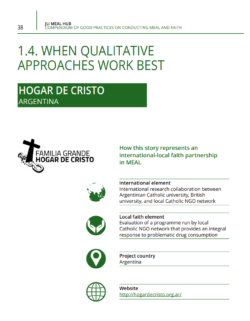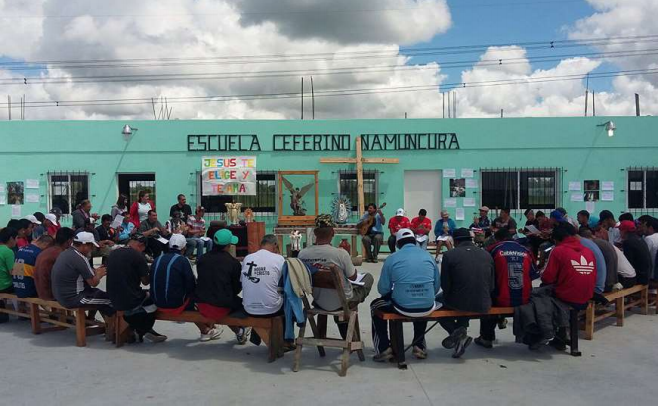When Qualitative Approaches Work Best – a guest blog post by Ann Mitchell
| 1 February 2021 | News
The following blog post is a contribution from Ann Mitchell, Full Professor in the Department of Economics at the Universidad Católica Argentina (UCA). Whilst in Bath working with Severine Deneulin at the University of Bath she trained as a QuIP Lead Evaluator in 2019 and went on to use the approach independently to evaluate a programme run by a local Catholic NGO network that provides support to drug users through neighbourhood centres. A review of her experience entitled When Qualitative Approaches Work Best forms part of a new Compendium of Good Practices on Conducting MEAL in Partnerships with International Actors and Local Faith Actors published by the Joint Learning Initiative on Faith and Local Communities.

Hogar de Cristo (or Home of Christ in English) is a faith-based federation of neighbourhood centres in Argentina which seek to provide an integral response to socially vulnerable people with drug addictions. A QuIP-based evaluation of this organization conducted through a partnership between researchers at the Pontifical Catholic University of Argentina and the University of Bath was one of ten studies selected for inclusion in the Compendium of Good Practices on Conducting MEAL (Monitoring, Evaluation, Accountability and Learning) in Partnerships with International Actors and Local Faith Actors published by the Joint Learning Initiative on Faith and Local Communities. The case study on the Hogar de Cristo evaluation titled “When Qualitative Approaches Work Best” describes how the research team adapted the QuIP approach to the local context and the evaluation of the complex processes of substance abuse recovery. It highlights the following aspects of the research project; first, as an academic-practitioner collaboration with a faith element, it was imperative for the local researchers and organization leaders to translate between academic and practitioner terminologies, as well as between secular and faith-based concepts, and adopt a common language that was sensitive to the organization’s methods and ethos. Second, the research project used a collaborative participatory process to develop a theory of change which was then used to inform the data coding process and as a benchmark when discussing the project’s results with organization leaders. Third, in addition to summarizing the QuIP results in tables, the authors carried out an in-depth qualitative analysis of the participant narratives, and made extensive use of exact quotes, so as to describe in greater detail the diverse pathways to recovery and the connections across dimensions.
At the end of the report you will find a link where a public version of our final report will be available following the (virtual) presentation of the project to be held on February 23rd.




Comments are closed here.